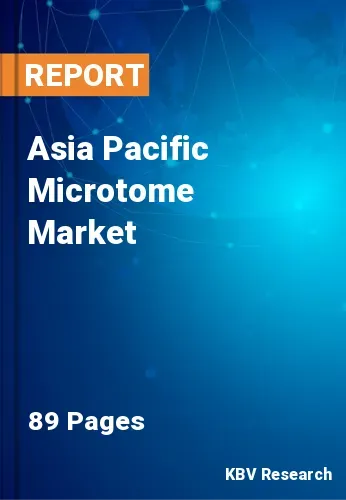The Asia Pacific Microtome Market would witness market growth of 7.4% CAGR during the forecast period (2022-2028).
Advances in microscopy-based diagnostic tools have sparked a surge in demand for more exact sample preparation devices like ultra-microtomes, also known as ultratomes. There has been a trend of diagnostic laboratory consolidation, which is driving demand for automation and high-throughput technologies. This is likely to assist the automated microtomes segment, which is expected to increase significantly during the projection period. For cancer detection, cytological tests employing tissue samples are becoming more popular. This factor is expected to drive the microtomes market.
In India, non-communicable diseases, such as cancer, are becoming serious public health issues. These diseases are caused by a change in lifestyle, have a long latent period, and require specific infrastructure and human resources to treat. India continues to have a high burden of preventable communicable diseases, creating competition for resources. According to cancer registry data, over 800,000 new cancer cases will be diagnosed in India each year. At any given time, the load is likely to be three times that of the 240,000 instances. Tobacco-related malignancies account for 35 to 50 percent of all cancers in males and 17 percent of cancers in women.
India is one of the few emerging countries that have developed a national cancer control strategy. Control of tobacco-related malignancies, early detection and treatment of uterine cervical cancer, and provision of therapeutic services, pain management, and palliative care through improved health infrastructure are all part of the plan. This is expected to facilitate the growth of the microtome market in the region.
Middle and low-income Asia-Pacific countries spend just under USD 250 per person per year on health, compared to USD 689 and USD 3,712 in upper-middle-income and high-income Asia-Pacific countries, respectively, after accounting for pricing differences between countries. In 2017, this accounted for around 4% of GDP in middle- and low-income Asia-Pacific countries, compared to 7.2 percent in high-income Asia-Pacific countries. Between 2010 and 2017, high-income countries had an average increase of 0.7 percentage points, more than double the 0.3 percentage point increase seen in upper-middle-income countries. The percentage of GDP spent on health in middle and low-income countries stayed steady between 2010 and 2017 (at 4 percent of GDP).
The China market dominated the Asia Pacific Microtome Market by Country in 2021, and would continue to be a dominant market till 2028; thereby, achieving a market value of $48.9 million by 2028. The Japan market is estimated to grow at a CAGR of 6.7% during (2022 - 2028). Additionally, The India market would witness a CAGR of 8% during (2022 - 2028).
Based on Product, the market is segmented into Instruments (Rotary, Cryostat, Vibrating, and Others) and Accessories. Based on Technology, the market is segmented into Fully Automated, Semi-automated, and Manual. Based on Application, the market is segmented into Disease Diagnosis and Medical Research. Based on End-user, the market is segmented into Hospital Laboratories, Clinical Laboratories, and Others. Based on countries, the market is segmented into China, Japan, India, South Korea, Singapore, Malaysia, and Rest of Asia Pacific.
Free Valuable Insights: The Worldwide Microtome Market is Projected to reach USD 605.5 Million by 2028, at a CAGR of 6.4%
The market research report covers the analysis of key stake holders of the market. Key companies profiled in the report include Danaher Corporation, Cardinal Health, Inc., PHC Holdings Corporation, Boeckeler Instruments, Inc., Bright Instruments Limited, Erma, Inc., Histo-line Laboratories, microTec Laborgeräte GmbH, MEDITE Medical GmbH, and Sakura Finetek USA, Inc.
By Product
By Technology
By Application
By End User
By Country

Our team of dedicated experts can provide you with attractive expansion opportunities for your business.

